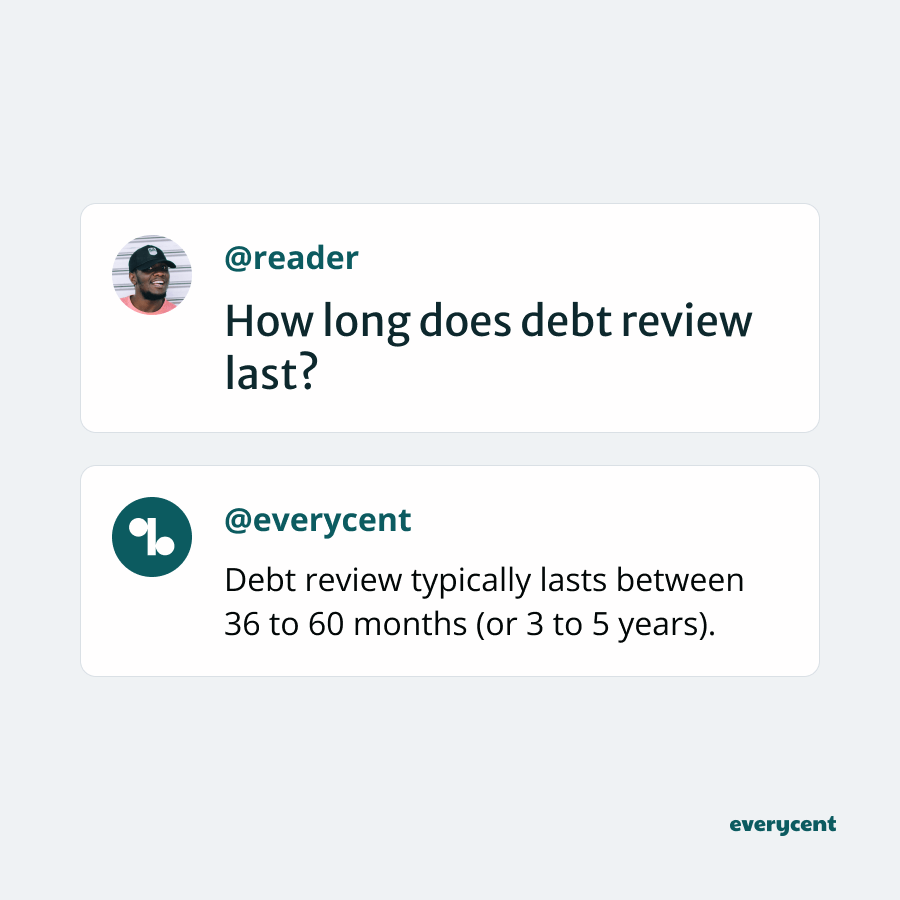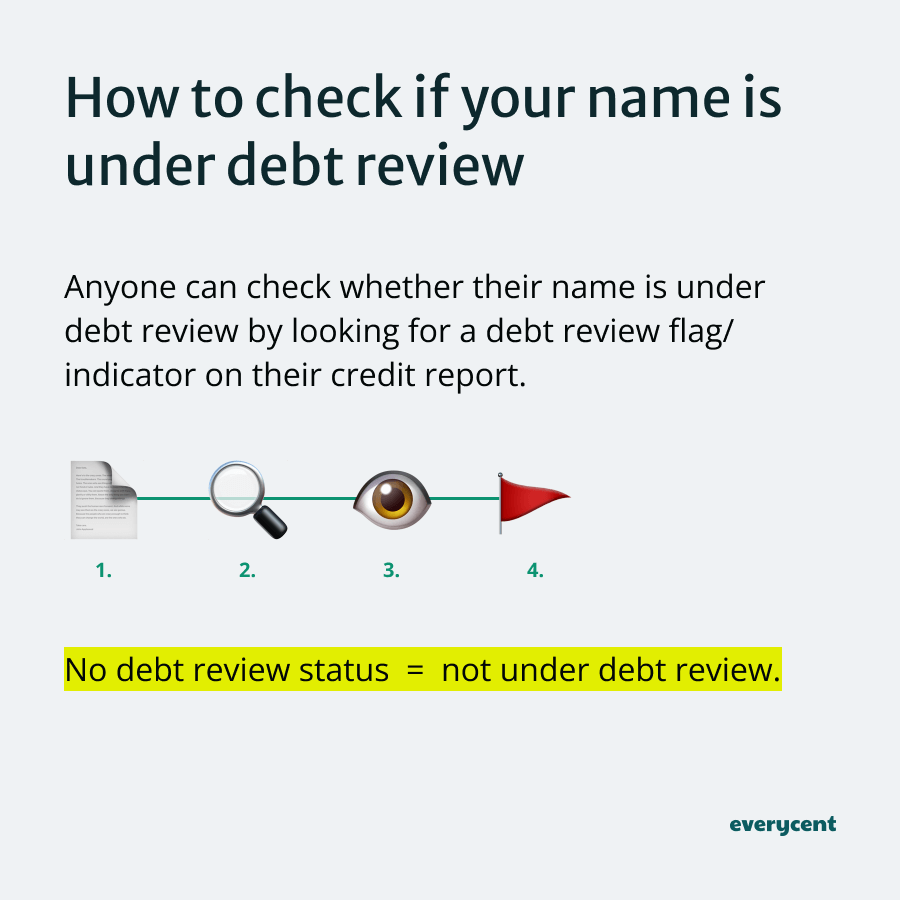Having an unbearable amount of debt is the worst.
If you’ve been struggling to keep up with your debt, then the term “debt review” might have caught your attention.
It really is one of the best available options for thousands of over-indebted South Africans.
But how long does it last? What does it mean for your credit record? And what awaits you on the other side?
Let’s find out.
How long does debt review last?
Debt review typically lasts between 36 to 60 months (or 3 to 5 years).
The exact duration of the debt review process is influenced by a variety of factors, including the amount of debt, the debtor’s available income, the terms of the repayment plan, and how consistently debt repayments are met.

Bonus topic: Debt counselling vs review vs consolidation (which is best?)
Factors that influence how long debt review lasts
Okay, so let’s start with a classic disclaimer: the duration of the debt review process varies for everyone and depends on each individual’s circumstances.
It’s not the magic answer, but it’s true.
These are the factors that influence how long debt review lasts:
- Amount of debt
- Available income
- The terms of the agreement (or repayment plan)
- Payment consistency and commitment

Amount of debt:
The more you owe, the longer it takes to repay.
It’s as simple as that.
For instance, if you owe a hefty amount on multiple credit cards, it will take longer than if you just have a small personal loan.
Available income:
Being able to pay off larger amounts can help speed up the process.
The converse can slow it down.
If money is tight, it might take longer to pay down your debts, even with the help of a debt review.
That’s totally fine. Remember, the aim of a debt review is to adjust your payments to what you can afford.
The terms of the agreement (or repayment plan):
Better terms make it easier to repay the outstanding debt. This is where an experienced debt counsellor can help (check out: what is a debt counsellor?).
Struggling to pay your debt bills?
Check to see if you qualify to lower your debt instalment and free up money for other expenses.
Payment consistency and commitment:
Staying consistent with your revised payment plan will ensure you come out of debt review sooner.
(Remember, the debt counsellor takes care of most of the work and preparation, but they can’t do it without your commitment—they can’t pay the bills for you.)
Next, let’s look at how to look up your debt review status.
How to check if your name is under debt review
Anyone can check whether their name is under debt review by looking for a debt review flag/indicator on their credit report.
If there is no debt review status or debt review flag (different credit bureaus indicate it differently), then you’re not under debt review.

Steps to check your debt review status
- Get your credit report
- Review the report
Use a registered credit bureau like Experian, TransUnion or XDS to get a detailed credit report. There are also several free credit report tools like MyCreditCheck, Kudough, and My Score Hero.
South Africans are entitled to one free comprehensive credit report from a credit bureau every year and unlimited free credit reports from the other tools that we listed.
Once you have your credit report, review it for any debt review indicators (usually a flag or a status indicator).
If something doesn’t look right, contact one of the registered credit bureaus to clarify or dispute the report.
Pro Tip: If you’re tech-savvy and always on the go, many credit bureaus now offer mobile apps.
These apps provide instant access to your credit profile and alerts for any significant changes, including updates on your debt review status.
If you find a debt review flag on your credit report. Here’s what it means.
Struggling to pay your debt bills?
What does the debt review flag mean?
The debt review status (or flag) indicates that the consumer is undergoing a process to manage and pay off their debts. This tells potential creditors that they shouldn’t let the consumer borrow more money (or create new credit) until the process is complete.
It’s also a sign of legal protection.
The purpose of this flag is twofold:
- Retroactively prevents the creation of more debt (borrowing new money)
- Provides legal protection from creditors (no repossession, or debt collection calls)
Some may view the first point as one of the disadvantages debt counselling (debt review).
However, the goal is to become debt-free, isn’t it? What better way than to eliminate new debt from the mix so that the focus stays on repaying what is already owed?
It’s the same reason why consumers aren’t approved for new loans under debt review. Not because they’re blacklisted (which a lot of people get wrong).
Luckily, the debt review status won’t be there forever.
It goes away at the end of the debt review process.
Here’s how it works.
Bonus reading: check out this article for an even deeper look at what debt counselling is and how it works.
How long does debt review stay on your name?
Debt review typically stays on your name for the duration of the review process till you get you’re clearance certificate and are legally declared debt-free. Which typically, takes between 36-60 months from start to finish.
After debt review, the debt review status is permanently removed from your credit history. The only thing that remains is your payment history.
So, as soon as the restructured payment plan is satisfied, and a clearance certificate is issued, then the debt review flag is removed from your credit profile.

Remember to keep the factors that influence how long debt review lasts in mind. Favourable circumstances could make the process go by even faster.
Not sure what a clearance certificate is? We’ve got you covered.
Clearance Certificate
What is a Clearance Certificate?
A clearance certificate is a formal document that confirms you have settled all the debts under review.
You can think of it as your debt-free graduation certificate.
How long does it take to get a Clearance Certificate?
The clearance certificate is issued once you’ve paid off all your restructured debts, and paid-up letters are submitted from all your credit providers.
Typically, after your last payment, it might take a few weeks to months for your debt counsellor to finalize everything and issue your certificate.
(Be prepared to exercise a little patience. More often than not, it takes a while)
Then, what happens next?
- Removal of the debt review flag—the credit bureaus are informed, and the debt review flag is promptly removed from your name.
- Rebuild creditworthiness—over time and with responsible financial behaviour, your credit score can now start to recover.
According to the National Credit Act (NCA) only your payment history remains on your credit record. The debt review status will be completely removed.
So, does this mean that you can access credit again?
Let’s see.
Struggling to pay your debt bills?
How long after debt review can you buy a house or a car?
Credit restrictions are removed as soon as the clearance certificate gets issued, and credit bureaus update the credit profile by removing the debt review status.
At this time, the only factor that affects eligibility for a home loan or car financing will be creditor approval based on the applicant’s credit score.
Generally, lenders might want to see some post-debt review financial stability first. So credit applications may not be approved just yet (but it depends; some might).
A few months of good financial behaviour can make all the difference.
So, while there’s no hard-and-fast rule, don’t rush it. Allow your credit score to improve while you save up a decent down payment—it’ll make the house or car cost less in the end anyway.
Final thoughts
36 to 60 months may sound like a lot to some.
But honestly, how long do you want to tread water and let things get worse before starting the process?
The great thing about debt review is that it works.
For those currently under debt review, remember that this is a temporary phase. With determination and the right support, you’ll be back on your feet and perhaps even dancing to the tune of financial freedom.
Now you know everything about how long debt review lasts, its implications, and what to expect post clearance certificate.
Want to learn more? Keep reading on Everycent.